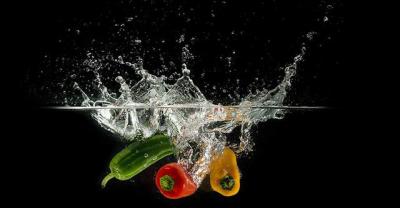Which is more nutritious than the frozen fruits and vegetables or the fresh ones?
Grass-roots influence New Vision Tian Chunhui
In the eyes of most people, melons, fruits and vegetables are naturally as fresh as possible, but is this really the case? Related studies have shown that the nutritional changes of different fruits and vegetables are different before and after freezing.
In supermarkets or vegetable markets, if you want to buy fresh strawberries and vegetables, people generally do not choose to go to the frozen food aisle. Frozen fruits and vegetables often look less fresh after thawing, which makes people feel that some of the nutritional value of the food will be lost once frozen. Therefore, it is generally believed that the fresher fruits and vegetables are more beneficial to human health. Is this view in line with the facts? On the other hand, fruits can be supplied year-round and relatively cheap after cryopreservation. On the other hand, fresh fruits and vegetables are only put on the market in large quantities during the peak season and shipped to various stores, and people usually store them in the refrigerator after they are bought home, at least for a few days or at most for a few weeks. However, we all want to know whether frozen fruits and vegetables have the same nutritional value as fresh ones.

In the early 1920s, ClarenceBirdseye invented quick-freezing technology. Since then, many people have tried to improve the freezing technology. The Inuit people of Alaska use rapid freezing to store fresh fish to prevent spoilage. Clarence Bozai follows the example of the Inuit in freezing food. Large ice crystals do not form destructive cells or destroy the original taste of the food. Vegetables and fruits contain 70% to 90% water. Once they are ripe, they lose water quickly, are eroded by microbes, and are degraded by enzymes, making them extremely prone to spoilage.
Nowadays, freezing technology is constantly improving, such as putting food into water before flash freezing. No chemicals are produced during cryopreservation. If you are worried that fruits and vegetables will lose their nutritional value after freezing, then keep in mind that fresh fruits and vegetables will also lose nutrients. In a study conducted by AliBouzari of the University of California and colleagues, they compared eight vegetables and fruits (corn, broccoli, spinach, carrots, peas, green beans, strawberries and blueberries), then analyzed the nutritional differences between fresh and frozen vegetables and fruits, and found no consistent regularity.
After freezing, the vitamin content in corn increases, but the vitamin content in green beans and blueberries decreases. When broccoli is frozen, riboflavin (one of the B vitamins) increases. On the contrary, the content of riboflavin decreases when fresh peas are frozen.
In another paper, the relevant researchers studied the contents of fiber and minerals (magnesium, calcium, iron and zinc) in fruits and vegetables before and after freezing. The results showed that the fiber and mineral contents of the above eight fruits and vegetables did not change significantly before and after freezing.
People who like to eat frozen vegetables and fruits think that freezing will prevent food from going bad. Fruits and vegetables can remain intact and their minerals and vitamins will not be lost if they are placed in a high-quality freezer and are guaranteed to be undisturbed. It is a subjective feeling to love the taste of vegetables and fruits when they are fresh. But freezing naturally has its wonderful uses. For example, frozen peas can be used to reduce swelling when the head is hit by a bump, which is much better than fresh peas.
- Prev

The dispute over the purchase of fruits and melons mediated before litigation
Weinan Politics and Law Network (special correspondent Li Yong) Recently, Huayin City Judicial Bureau pre-litigation mediation office accepted a typical melon and fruit order dispute case. By...
- Next

Does the old man have a nosebleed in winter, is it useless to eat more melons and fruits? Beware is a harbinger of this!
Recently, Lao Dai has a worry, always nosebleed, beginning to think that the winter weather is too dry, eating caused by anger. Go to the third Hospital of Changsha for cardiology examination.
Related
- Moge, come on! The staff of the peasant association in the producing area of cantaloupe were frightened when the crowd gathered.
- Causes and Solutions of low Fruit setting rate of Apple
- Symptoms and control measures of passion fruit virus disease
- Fruit growing lesson: how do apple orchards keep high yields?
- Can you build orchards in the mountains? What are the pros and cons?
- How to manage the coloring period of Crisson grape?
- This paper introduces the processing technology of two kinds of fig products.
- How much is a month for retired teachers in rural areas by 2020?
- How can strawberry planting increase sugar content? We should pay attention to management in many aspects.
- What are the cultivation techniques on how to improve the yield of golden fruit?

